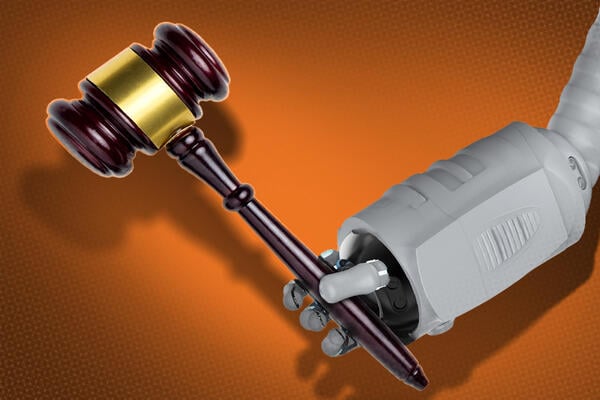
More Law Schools Embrace AI
As of 2024, 55 percent of law schools offered courses on AI.
Photo illustration by Justin Morrison/Inside Higher Ed | Maxxa_Satori and PhonlamaiPhoto/iStock/Getty Images
As more and more law firms integrate generative artificial intelligence into their practices, a growing number of law schools are preparing future lawyers to adapt.
Nearly three years after OpenAI’s ChatGPT went mainstream—followed by Anthropic’s Claude, Google’s Gemini and a host of other similar platforms—some 30 percent of law offices are using AI-based technology tools, according to data published by the American Bar Association this past spring. While ChatGPT is the most widely used, legal research–specific tools, such as Thomson Reuters’ CoCounsel, Lexis+ AI and Westlaw AI, are also catching on in the sector.
At the same time, 62 percent of law schools have incorporated formal opportunities to learn about or use AI into their first-year curriculum; 93 percent are considering updating their curriculum to incorporate AI education. In practice, however, many of those offerings may not be adequate, said Daniel W. Linna Jr., director of law and technology initiatives at Northwestern University’s Pritzker School of Law.
“Law firms are starting to expect more and more that students will be exposed to this in law school,” he said. “But they also understand that the current reality is that not many law schools are doing much more than basic training. And some may not even be doing that.”
AI-Savvy Will Have ‘Leg Up’
At its best, experts believe AI has the power to make lawyers more efficient and accurate, as well as the potential to expand public access to legal services. But as fake citations and misquotes appearing in AI-generated legal filings have already shown, lawyers need more than access to these tools to get the most out of using them. They need to know how they work and recognize their limitations.
“Law schools have to prepare students to be intentional users of this technology, which will require them to have foundational knowledge and understanding in the first place,” said Caitlin Moon, a professor and founding co-director of Vanderbilt Law School’s AI Law Lab. “We have to preserve that core learning process so that they remain the human expert and this technology complements and supports their expertise.”
It’s not clear yet the extent to which AI will reshape the legal job market over the next several years, especially for new lawyers whose first jobs after law school have historically involved reviewing documents and conducting legal research—two areas where AI tools excel. According to one interpretation of a new report from Goldman Sachs on how AI could affect the workforce, 17 percent of jobs in the legal sector may be at risk.
“Law firms on the cutting edge of innovation are certainly trying to figure out how leveraging this technology improves their bottom line,” Moon said. “For recent graduates, those who are coming into firms with an understanding and familiarity with AI have a leg up.”
Pressure on Law Schools
Regardless of what’s to come, all this uncertainty is putting pressure on law schools across the country to meet the moment, said Gary Marchant, faculty director of the Center for Law, Science and Innovation at Arizona State University’s Sandra Day O’Connor College of Law, which began offering an AI specialization last year.
“It creates a requirement for law schools and law firms to train future lawyers differently, so that they learn some of the third- and fourth-year associate skills while they’re still in law school,” Marchant said. “Even if AI doesn’t advance any further, it’s already come so far that it’s transforming the practice of law, and it could change even more. Right now, the conclusion is that lawyers who know AI will replace lawyers who don’t know AI.”
Recognition of that reality drove the University of San Francisco School of Law to become the first in the country to integrate generative AI education throughout its curriculum. Those efforts will be aided through partnerships with Accordance and Anthropic, the school announced last week.
“AI is something every student needs to understand, no matter what kind of law they want to do,” said Johanna Kalb, dean of USF’s law school. “Given how quickly these AI tools are improving and becoming more specialized, each of these innovations is going to change what lawyers are being asked to do and what skills they really need.”
While USF may be one of the few law schools with an AI curriculum mandate, 55 percent of programs offered specialized courses designed to teach students about AI in 2024, according to the most recent available ABA data.
That percentage has likely increased over the past year, said Andrew Perlman, dean of Suffolk University Law School and a member of the ABA’s Task Force on Law and Artificial Intelligence.
This fall Suffolk’s law school, which launched one of the country’s first legal technology programs nearly a decade ago, is requiring all first-year students to complete a custom generative AI learning track as part of its course on legal practice skills.
“There was a lot of hesitation early on about how useful AI may be inside law practices, but there is now an increasingly widespread recognition that hiring lawyers who understand both the traditional methods of practicing law and have the ability to embrace AI is a useful combination,” Perlman said. “Training students with that new skill set is going to put our graduates in a better position to succeed in the long run.”
Jacob Levine, a second-year student at Harvard Law School, got a taste of the demand for that balance during an internship at a law firm this summer.
“AI was a tool that was present and using it was permitted, but there was a lot of emphasis on gauging the ability of the individual to be able to do the analytical work that’s expected of a young attorney,” he said. “It’s important to know how to use AI but not purely rely on it and use it blindly. A big part of being able to do that is knowing how to do everything yourself.”
Source link



